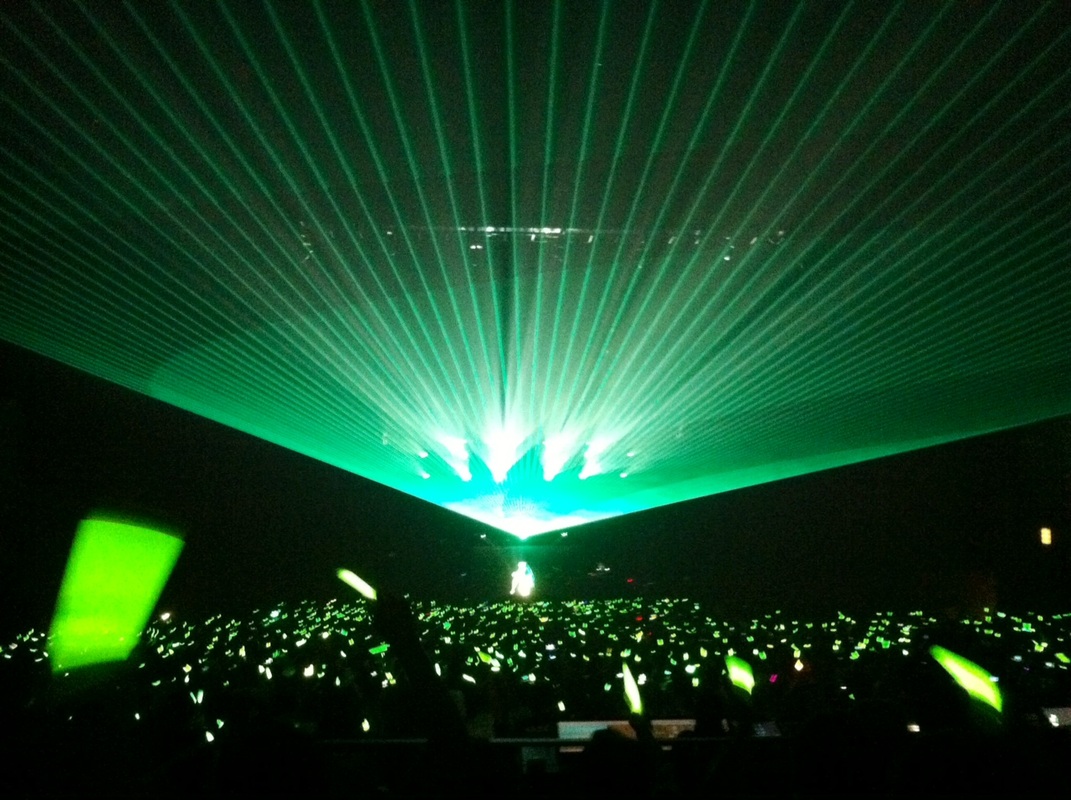|
"World Is Mine," sure, but Hatsune Miku is still working hard for the money in the United States. The Japanese Vocaloid sensation has enjoyed her widest exposure this year stateside, from opening the first leg of Lady Gaga's summer tour to her recent appearance as the musical guest on "The Late Show with David Letterman." Is it working to expand her audience here? The crowds at the Los Angeles Miku Expo last weekend seemed largely still the niche fans — younger, lots of cosplay, very familiar with the set list and all the cues. There were many more refreshing demographic anomalies, though. In the general-admission pit up front, for instance: a guy wearing a white T-shirt, boots, and a straw cowboy hat. Welcome, カウボーイ! I also spotted a noticeable increase in grey hair. A colleague chatted up an older couple that included a veteran sound engineer intrigued by the tech. I interviewed a woman of my own fortysomething vintage sitting in front of me at the Sunday concert once I guessed that she was not a parent of someone else present. "My daughter actually pointed [Miku] out to me," she said. "But she's not a fan. She's not here. I'm the one that got hooked. ... The hologram spectacle is one thing — I just like the music." Sunday's concert was very good. This time out, Miku was presented up front as a digital communication — the show opened with video graphics showing a status bar in action ("Now loading ...") followed by the message, "You've got mail!" At the end of the show, after Miku had disappeared into the floor, head bowed solemnly, the screen bookended the idea by announcing a "new mail" and then: "Mail sent to next location." As if the entire set list was an in-box of catchy messages from friends. Which, really, it is. One crowd paying it forward to the next. The visuals at this show were dazzling, almost bewildering, with a plethora of lasers that would weaken the knees of any Pink Floyd fan. The spectacle included real pyro, two different fog-machine rigs, and confetti cannons. The animations were crystal clear — in fact, the screens on either side of the stage, showing the directed camera views, were slightly out of focus, so the Vocaloids on stage actually appeared to be more distinct than the extra level of mediation. (The cynic in me wondered: was that done on purpose? My ingrained, concertgoing habit of turning my eyes to the screens was pleasantly troubled; each time I looked left or right and saw that slightly softer image, I immediately turned my attention back to the stage. If that wasn't done on purpose, it should be.) Despite the band being stripped down to just the basics (guitar, bass, drums, and — I love how he was billed — a "keyboard / manipulator"), the sound was strong, dense, a ton of sonic information but parsed out through one of the best live mixes I've heard. It must be crazy mixing that show so that those highly machined vocals stand out as clearly as they do. One of my favorite parts of the Vocaloid characters' presentations has been the inclusion of microphones in the animations — remediating the concert experience by giving us familiar visual cues to the experience — and, as someone helped me discover Sunday, the soundtrack even includes the pop one hears when a human hand grabs a live mic. Totally unnecessary, totally cool. Miku's performance on Letterman's show a few days earlier was, well, as odd as expected. Often when there's a bewildering spectacle at the end of his show, Letterman will talk it up within the 55 minutes leading up; not so, this show. When the time came, he simply read his cue-card introduction of her: "Here we go. Oh, boy! Now listen to me: Our next guest is a computer-generated Vocaloid personality from Japan" — a phrase he chewed thoroughly and enjoyed, then wrapping the rest up with a trademark dopey grin. Miku performed "Sharing the World," a new song that maybe was not the best showcase, with the live quartet. She appeared on a screen situated farther back, among the band, so to newcomers I'm guessing it looked like a band playing alongside a big-screen TV. Her presence didn't pop. At the end, Letterman appeared standing next to the screen, and there was a moment when it seemed as if there might be an exchange between them, but no. She was left merely as a technical oddity, and no one watching was given any idea as to the community that drives her, that she embodies. Letterman's show may not have been the best match of subject to audience. Had she appeared on, say, Jimmy Fallon's show, I suspect he would have been much more enthused, engaged, and thus explanatory. He'd probably have tried to have the animators create a digital Fallon to duet with her.
1 Comment
Mario
10/16/2014 05:44:47 pm
Well, first let me say I'm on my way to the mid 40's but still I love Miku and some of the other vocaloids.
Reply
Leave a Reply. |
this blahg
I'm THOMAS CONNER, Ph.D. in Communication & STS, and a longtime culture journalist. Categories
All
Archives
June 2024
|


 RSS Feed
RSS Feed